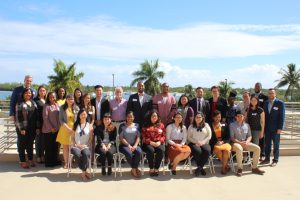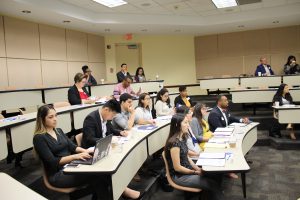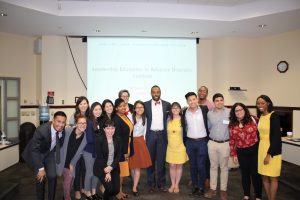
SCCAP acknowledges that the success of the society and the field of psychology is dependent upon the diversity of individuals stepping up to fill leadership roles. In order to promote leadership development and potential future leaders within SCCAP, its Diversity Committee created the bi-annual Leadership Education to Advance Diversity (LEAD) Institute.
The goal of the SCCAP Leadership Education to Advance Diversity (LEAD) Institute is to provide professional development, networking, and leadership skills for graduate students and early career professionals (ECP’s). Graduate students and ECP’s who are members of Division 53 (SCCAP) are eligible to apply. The full-day leadership institute offers LEAD participants (also known as LEAD fellows) to attend sessions with invited guest speakers that address topics such as: leadership in the community and profession, cultural sensitivity in practice, tips on publishing, and learning skills in media psychology.

LEAD is intended to provide graduate students and ECP’s from diverse groups (e.g., ethnic and racial, sexual and gender diversity, individuals with a disability) the opportunity to gain leadership and professional skills, and increase their professional network. LEAD fellows also have the opportunity to be on a special email distribution list that announces educational, leadership, and award opportunities. Participation in LEAD also allows for eligible participants to earn Continuing Education Credits. LEAD will also produce periodic virtual learning opportunities at no cost to participants.
If the LEAD Institute is held virtually due to public health concerns and travel is not required, upon completion of the program LEAD Fellows will be given $300 to put toward participation in other SCCAP sponsored conferences or educational opportunities.

Eligibility Criteria for LEAD Fellows:
- This institute is open to graduate students from APA, PCSAS, or CPA-accredited programs, or from schools that have officially entered into the accreditation process, OR ECP’s (members within 10-years of earning their doctoral degree).
- Applicants must be a member of SCCAP. SCCAP is free to join for students and post-docs (https://sccap53.org/join/).
- Fellows that are selected will also be required to demonstrate their involvement in leadership activities within 1-year after this program (e.g., serving as a member of a SCCAP committee).
- Accepted Applicants must be domiciled in the United States of America to receive the monetary award. Non-US-domiciled members may still participate in the educational portion of the Institute.
THE APPLICATION PORTAL FOR 2023 IS CLOSED
The next LEAD will be held in 2025. The application period will be announced over the listserv in late 2024
Applications for 2025 LEAD will be accepted TBA.
Notifications will be sent by TBA
If you have questions about eligibility criteria or other parts of the application process, please contact sccap@sccap53.org.
*Applications will be evaluated based on the applicant’s CV and their description of the benefits of being selected as a LEAD fellow.
Erlanger Turner, PhD
LEAD Institute, Chair
SCCAP encourages and welcomes applicants with diverse backgrounds with respect to age, disability, gender, geography, nationality, race, religion, ethnicity, and sexual orientation.
The content is locked to SCCAP Members Only
Login To Unlock and Access Content.
Congratulations to the 2023 LEAD Institute Fellows
| Amanda Acevedo | Northern Arizona University |
| Veronica Acosta, Ph.D. | Hawai’i Pacific University |
| Jasmine Aguirre | University of Tennessee Knoxville |
| Selena Baca | University of Kansas |
| China Bolden | Seattle Pacific University |
| Jasmin Brooks | University of Houston |
| Vanessa Calderon, Ph.D. | University of Southern California |
| Randi Cheatham-Johnson, Ph.D | UT Southwestern Children’s Medical Center |
| Brianna Downey | Fielding Graduate University |
| Artesia Dunbar | Wright State University- School of Professional Psychology |
| Loretta Eboigbe | University of Maryland- College Park |
| Ãlvaro Gamio Cuervo | University of Massachusetts Boston |
| Josh Golt | University of Alabama |
| Christopher Gomez | University of Kansas |
| Erika Gustafson, Ph.D. | University of Illinois at Chicago |
| Melissa Hall | University of Notre Dame |
| Donica Harper | Fielding Graduate University |
| Brittany Hinkle | Howard University |
| Irene Jacobs | Virginia Commonwealth University |
| Nicole Keller | Hawaii Pacific University |
| Amani Khalil | Purdue University |
| Maria Jose Lewis, Ph.D. | Santa Barbara Neighborhood Clinics and California Counseling Clinics |
| Metzli Lombera | Pennsylvania State University |
| Nicole Lorenzo,PhD. | American University |
| Ceewin Louder | University of Miami |
| Esmeralda Navarro | University of North Carolina – Chapel Hill |
| Tanya Nichols, Ph.D. | Mt. Washington Pediatric Hospital |
| Caterina Obenauf | University of Tennessee |
| Suh Jung (Rylee) Park | University of Missouri-Columbia |
| Dominique Phillips | University of Miami, Coral Gables |
| Nyla Rogers | Howard University |
| Anna Maria Ros, Ph.D. | Lurie Children’s Hospital / Northwestern Feinberg Med School |
| Katherine Sanchez, Ph.D. | Arizona State University |
| Elena Schiavone | Florida International University |
| Suzanna So, Ph.D. | California State University Long Beach |
| Marie Tanaka | University of Arizona |
| Sheree Tarver Sylva-Senette, Psy.D. | Dallas County Juvenile Department |
| Rachel Thompson | Regent University |
| Briana Williams | Michigan State University |
| Stephanie Wilson | Virginia Commonwealth University |
| Blanche Wright, Ph.D. | UCLA Department of Health Policy and Management |
| Yexinyu -Yolanda Yang | University of North Carolina at Chapel Hill |
| Stephanie Yu | University of California, Los Angeles |
| Arie Zakaryan, Ph.D. | Phoenix Children’s Hospital |